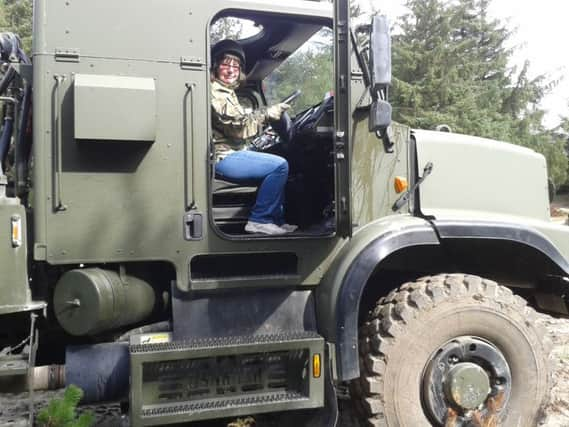Carrick observer of Army Reserve exercise in Denmark


Connie Millar. who works with the Belfast Health and Social Care Trust, was one of a group of employers who observed Exercise VIKING STAR.
She saw how reserve soldiers from 152 (North Irish) Regiment The Royal Logistic Corps – once affectionately known as ‘the drivers’ regiment’ - has re-roled as an integral part of the Army’s only fuel regiment.
Advertisement
Hide AdAdvertisement
Hide AdThat training was put to the test at Billund Army Camp in Denmark when reservists tackled the simulated challenge of building and operating a full-scale bulk fuel installation as part of their preparation for petroleum operations in a conventional warfare scenario.
It’s a far cry from Connie’s usual day job, but the intrepid health care professional was prepared to don helmet, army jacket and stout boots to find out more. She says: “I had absolutely no idea what to expect and, even though I was there to observe, I was a bit nervous about the sort of demands that would be made of me, for I’m no GI Jane! However it was a fresh learning challenge and an opportunity to see what benefits the public sector can expect when it employs a member of the Reserve Forces.
“On the face of it, there isn’t too much need for petroleum operations, tanker driving or ‘soldiering’ skills in my sector, but I discovered that Army Reservists’ skills and talents are more wide-ranging than that. High fitness levels, leadership, team and communications skills are all developed in the Reserves and those are things which are valued in any and every workplace.”
On her three-day trip, Connie saw how reservists work alongside regular soldiers to cater for all the military’s fuel and oil needs, storing, handling and delivering petroleum products and perfecting their training in setting up and cleaning pipelines, fuel farms and storage tanks and testing for contamination. While the reservists each have specialist, often highly technical skills, they must also be trained soldiers.
Advertisement
Hide AdAdvertisement
Hide AdConnie adds: “It’s very easy to think of the Army Reserves as a hobby, but there’s a huge amount expected of these men and women and I take my hat off to the people who train them. Training is an ongoing priority in healthcare, so I feel it was useful to see how ‘152’ is managing a complete re-roling, with all the re-training and change management issues that creates.”
As she clambered in and out of a massive military lorry, Connie was also interested in the logistics of catering in the field, providing energy- and morale-boosting food and drink for a highly active workforce who may be miles away from anything resembling a kitchen. For generations one military solution has been ration packs.
Connie said: “Catering is a massive issue for us in healthcare and we are always looking at how to improve what we do, balancing nutrition and taste with value. I certainly wouldn’t suggest giving our patients ration packs, but the delicious healthy snacks and drinks I tasted gave me some food for thought.”
The unit which Connie saw on exercise in Denmark is now starting preparations to mobilise more than 50 reservists to support the UN on a six-month peacekeeping tour of Cyprus.
Advertisement
Hide AdAdvertisement
Hide AdCommanding Officer Lieutenant Colonel Paul Smith says: “Not every Army Reservist will be deployed overseas in his or her career, but they must all be prepared for that eventuality and we hope that they will have supportive families, employers and community behind them.
“We were delighted to show this group of influential employers what we do and to illustrate some of the benefits which a reservist can bring into the civilian workplace.”